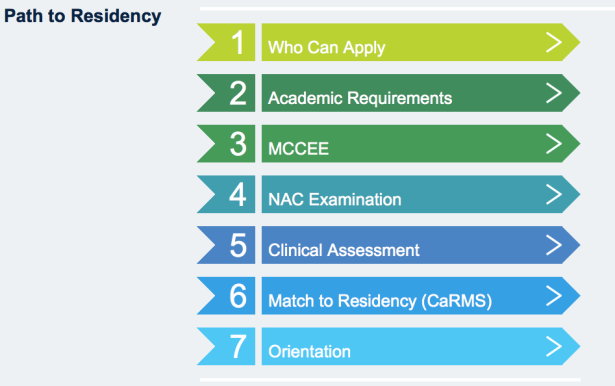I have previously outlined the steps to apply for medical residency. You can start by reading THIS first. I’ll go through some of the steps again quickly but this time, this is specific to BC residents.
1. Pass your Medical Council of Canada Evaluating Examination (MCCEE). The MCCEE was phased out in November 2018. So, I believe that very soon, they will replace this requirement with the MCC QE Part 1.
2. Pass your National Assessment Collaboration OSCE (NAC OSCE) and at least be registered for your MCC QE Part 1.
3. Pass your IELTS. You cannot apply to a residency program if you do not have at least a score of 7 in each component (writing, reading, listening and speaking).
4. Take the compulsory University of BC (UBC) Clinical Assessment Program (CAP). UBC’s Clinical Assessment Program is a one-day clinical assessment which takes place twice a year in June and October/November. Visit the timeline page for a list of important upcoming dates and application deadlines.
During this assessment, candidates’ clinical skills and past experiences are tested through a series of structured examinations and oral interviews. The results of the assessment are then sent to CaRMS on behalf of the candidate.
If you don’t do the CAP, you cannot apply for a residency position in British Columbia.
5. Apply to the BC residency program of your choice. Internal Medicine has 3 positions, Pediatrics 1, Psychiatry 2, and Family Medicine 52 positions (spread over 11 locations within BC).
5. You can also apply for residency programs in other provinces to increase your chances of getting accepted. However, you need to find out about province-specific assessments as these might be used to filter through residents in addition to the usual NAC, MCCEE, MCCQE1, and IELTS.
9. Programs that like your application will send you an email inviting you for an interview. The UBC residency interviews are usually in an MMI format. Please read ‘What is an MMI?’.
10. After the interview, you will be placed on a ranking list and then you might be matched to one of the programs that interviewed you.
11. If you get matched, then this means you have been accepted to start your residency and you will proceed to the next step. Take note that IMGs who match to residency programs in British Columbia will be expected to fulfill Return of Service (ROS) Obligations. Read more about ROS obligations.
12. Pre-residency orientation. Fortunately, BC doesn’t have any pre-residency evaluation, unlike some other provinces (e.g Alberta and Ontario). Instead, all matched IMGs participate in a week-and-a-half-long orientation in Vancouver (which holds in June), so that they can gain a better understanding of the Canadian medical system. They will also be paid during this orientation period. FAQs about the pre-residency orientation.
13. Residency starts on 1st July! Yay!

You might also enjoy reading about the steps to apply to residency programs in Saskatchewan, Alberta, Manitoba, and Ontario.
If you have more questions, please leave a comment or send me an email at internationalphysiciantraining (@) gmail.com.
’til my next post……

Hi ; thanks for your super effort and by far the most simple clear explanation I have come across , my question is currently I am working in a non training post in OBGYN in Ireland , I have studied in North Africa, I have Canadian PR but I haven’t settled in yet, my concerns are about getting chances to train in obstetrics and gynecology,what is your advice for me and what are my chances of landing a residency post in OBGYN ¿
Thanks
Dary
LikeLike
Hello Dr Ahmed. I’m glad you found my blog helpful. There are currently 5 ObGyn Training positions for IMGs in the whole of Canada. I don’t think I need to tell you how competitive that is and the need for extremely good scores, great references and if possible published research. You can visit this link for more info https://www.carms.ca/match/r-1-main-residency-match/program-descriptions/
LikeLike
Thanks a lot for your reply, do you think should I still do the MCCEE or should I just wait for it to be phased out ? I was thinking doing the Nov. one
I am still open to other specialities but I would , of course, prefer obstetrics.
Thanks again
LikeLike
Yes it’s a good idea to be flexible and willing to do other specialties. I think you can do the MCCEE mainly to gain Canadian medical exam experience.
LikeLike
You are a star ! Thanks for your time,much appreciated!
Darin
LikeLike
👍🏾
LikeLike
Doctor Fomski, thank you so much for all the information you wrote on this blog. I’m a medical student from Brazil on my last year (graduating in November!) with a deep desire to move to BC and work as a physician.
I plan to apply for a provisional license/Family Medicine residency in early 2020. However, I do have a question.
I absolutely love General Surgery, and had plans to follow that path here in Brazil.
I assume there aren’t many positions for IMGs, and couldn’t find much information about it, but by any chance, do you have any extra info on how an IMG could achieve a spot in residency for General Surgery?
Would it be easier if I worked as a Family physicians/GP for a few years in Canada before?
Thank you in advance,
Mariana
LikeLike
Hello Dr Mariana, you’re right to imagine General surgery residency might be difficult to enter into. There are 4 IMG spots for General surgery in the whole of Canada. I wish I had some extra info to help you know how to be successful at being placed. I do however think that some things which may help include previous experience in general surgery, a Canadian surgical assistant job, excellent references and possibly published research. It might be better to work as a family physician for a few years and then try applying. There’s still no guarantee though.
LikeLike